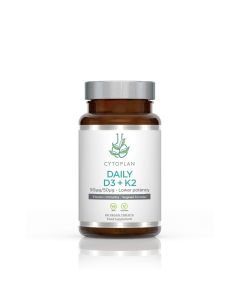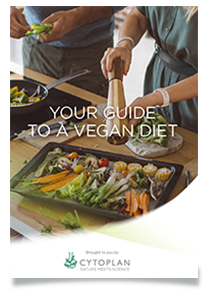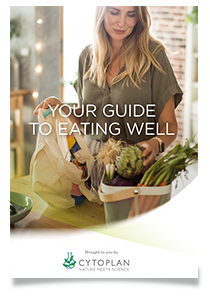Vitamins are not naturally produced by the body, so must be supplied through external sources. Eating a healthy diet is the best place to start, however, ensuring that we are getting a sufficient intake of vitamins from diet alone can be challenging, and this is where supplementation can play an important role.
Within our range of vitamin supplements we provide vitamin A, B vitamins, vitamin C, vitamin D and vitamin E in various strengths and forms including tablets, capsules, liquids, powders and gummies. Follow the links to learn more about our vitamin B, vitamin C and vitamin D supplements. Providing vitamins in their most bioeffective form is a key consideration when formulating our supplements, for example, we provide folic acid as methylfolate, which is a stable and methylated form of folate, as well as vitamin B12 in the form of methylcobalamin.
We also have vitamin supplements in Wholefood and Food State forms. What sets these products apart is that both Food State and Wholefood nutrients are used by the body in the same way as food nutrients. Through replicating nature, we strive to provide the best, most natural and most bioeffective supplements to support optimal health. As well as being beneficial for all, they are gentle on the body making them particularly suitable for individuals who are unwell or who have sensitivities. Our Cherry C, Wholefood Vitamin D3 Vegan, Food State Vitamin C, Organic Vitamin C, Multi B Extra and Super B Extra are all good examples.
You can learn more about the Wholefood and Food State process here.
All our vitamins are suitable for vegetarians, with the vast majority also being suitable for vegans too.
How do I know if I need to take vitamin supplements?
For many years at Cytoplan we have presented the rationale that there is a "nutrition gap" in the diets of most people by virtue of several factors. The nutrition gap describes the difference between the levels of nutrients the average person eating a reasonable Western diet is obtaining from food, and those nutrient levels identified by research as being needed for optimal health. Nutrition supplements can bridge this gap when they contain the appropriate, and safe, levels of nutrients as long as the nutrients are in a bioeffective form.
Supplementing with vitamins is a personal choice, however there are certain circumstances when supplementation might be advisable.
Vitamin tablets may be recommended if you struggle to eat a balanced diet, or don't consume particular foods, for example, people following a vegetarian or vegan diet.
In the UK, the number of people with sub-optimal levels of vitamin D is thought to be fairly widespread. There are only a few food sources of vitamin D (even less if you are vegan), so the main way to ensure we get enough vitamin D is to be out in the sunshine, which allows vitamin D to be produced within our skin. This is fairly simple if you live in a sunny climate, but in the UK we can be at a bit of a disadvantage! Plus the sun is only strong enough for our skin to produce vitamin D between March and October. The winter months are therefore a good time to take a vitamin D tablet.
Individuals with vitamin B12 deficiencies often need a regular vitamin supplement.
If you are trying to conceive, or are in the first twelve weeks of pregnancy, it is recommended to supplement with 400µg of folic acid to help prevent neural tube defects in the developing foetus.
If you would like advice on your individual vitamin requirements, we would advise that you speak to a health professional, or complete our free health questionnaire.
What vitamins should I take?
Due to diet, demands, specific goals and genetics, we all have very individual needs for vitamin supplements. If there are additional needs, targeting a specific vitamin can be useful as well as supplementing with a multivitamin and mineral.
Vitamins are used in a variety of ways. The immune system is dependent on vitamins A, C, D and E to support its normal function. A range of B vitamins are required to support energy metabolism, the reduction of tiredness and fatigue, nervous system function, mental health and mood. Vitamins C and E are both antioxidants which help to protect cells from oxidative stress. Vitamin C also contributes to normal collagen formation. As well as supporting the immune system, vitamin D is needed for the normal growth and development of bone in children, as well as maintaining bone health and muscle function in adults.
To allow you to be specific and tailor your nutrition program to meet your individual needs, we have an extensive range of single and combination vitamin supplements for men, women and children.
What are the benefits of taking vitamins?
Are vitamins stored within the body?
Vitamins are grouped into two categories; fat-soluble vitamins and water-soluble vitamins.
Fat-soluble vitamins are stored in the body's liver, fatty tissue and muscles. The four fat-soluble vitamins are vitamins A, D, E and K. These vitamins are absorbed more easily by the body when consumed in the presence of dietary fat.
Water-soluble vitamins are not stored in the body, and include vitamin C and all of the B vitamins. Any excess amounts of these vitamins are excreted form the body in urine. In order to prevent deficiencies of water-soluble vitamins, they need to be consumed on a regular basis.
Do vitamins have side effects?
It is highly unlikely that the recommended dose of vitamins will cause you to experience unwanted side effects.
Supplementing with certain B vitamins (including vitamin B2 and B12) can turn your urine a bright yellow colour. However, if this happens you can relax in the knowledge that it is harmless and completely normal.















